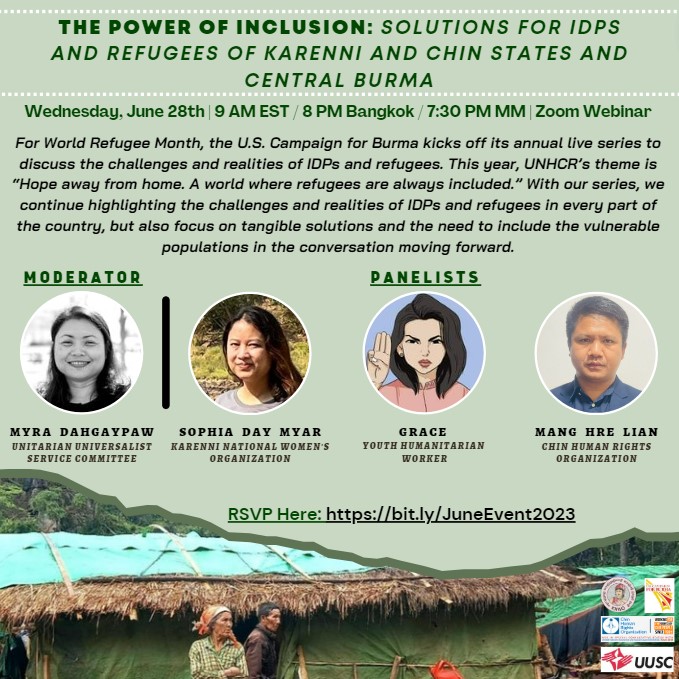The Power of Inclusion: Solutions for IDPs and Refugees of Karenni, Chin states and Central Burma
Our friends over at the US Campaign for Burma has put together an expert panel to issues pertaining to the refugee and IDP crisis in Myanmar and Bangladesh.
From the U.S. Campaign for Burma:
Together with Karenni National Women’s Organization, Chin Human Rights Organization, and UUSC, we will be launching our “Power of Inclusion” live event series on Wednesday, June 28th at 9 AM EST, 8 PM Bangkok, 7:30 PM MM via Zoom Webinar. Our first panel of the series will share the challenges and hurdles experienced by IDPs and refugees from Karenni and Chin states and Central Burma, but also the need to include the voices of these impacted communities in all conversations moving forward. This discussion is becoming increasingly relevant as forced repatriation of the Rohingya continues to make waves in the news.
When: Wednesday, June 28th
Time: 9 AM EST, 8 PM Bangkok, 7:30 PM MM Time
Where: Zoom Webinar
Panelists:
Sophia Day Myar, Karenni National Women’s Organization
Grace, Youth Humanitarian Worker
Salai Mang Hre Lian, Chin Human Rights Organization
Moderator:
Myra Dahgaypaw, Unitarian Universalist Service Committee
RSVP LINK: https://bit.ly/JuneEvent2023
Who are the Rohingya?
The Rohingya are a Muslim ethnic minority group that primarily lives in Myanmar, also known as Burma. They have faced persecution, discrimination, and violence for decades, with the most recent wave of violence beginning in August 2017. This has led to one of the largest refugee crises in the world, with hundreds of thousands of Rohingya fleeing to neighboring Bangladesh.
History of the Rohingya
The Rohingya have been living in Myanmar for centuries, with some historians suggesting that they have been in the country since the 12th century. They are primarily located in the western region of Rakhine State, bordering Bangladesh. However, the Myanmar government does not recognize the Rohingya as an ethnic group, instead calling them “Bengalis” and claiming that they are illegal immigrants from Bangladesh.
The Rohingya have faced discrimination and persecution for decades, with the Myanmar government denying them citizenship and restricting their access to education, healthcare, and other basic services. In 1982, the government passed a citizenship law that effectively rendered the Rohingya stateless, as it required them to prove that they or their ancestors had lived in Myanmar before 1823.
Since then, the Rohingya have faced multiple waves of violence and persecution. In 2012, a series of clashes between the Rohingya and Rakhine Buddhists led to the displacement of tens of thousands of Rohingya. In 2015, a boat carrying Rohingya migrants was turned away from Malaysia, leading to a crisis in the Andaman Sea. However, the most significant wave of violence occurred in August 2017.
The Rohingya Crisis
In August 2017, the Myanmar military launched a violent crackdown against the Rohingya in Rakhine State. The military carried out mass killings, rape, torture, and arson attacks against the Rohingya, forcing hundreds of thousands to flee to neighboring Bangladesh. The United Nations has described the crackdown as a “textbook example of ethnic cleansing.” The U.S. State Department has determined the treatment of the Rohingya is a genocide.
The Myanmar government has denied any wrongdoing and has claimed that it was responding to attacks by Rohingya militants. However, investigations by the United Nations and human rights groups have found evidence of widespread atrocities committed by the military and have called for accountability for those responsible.
The crisis has resulted in one of the largest refugee populations in the world, with more than 1 million Rohingya living in refugee camps in Bangladesh. The conditions in these camps are dire, with limited access to basic services like clean water, sanitation, and healthcare. The refugees are also vulnerable to exploitation and trafficking.
The international response to the crisis has been mixed. Some countries, like Bangladesh, have welcomed the Rohingya and provided them with assistance. However, others, like China and Russia, have blocked efforts to hold Myanmar accountable for its actions. The United States and other Western countries have imposed sanctions on Myanmar, but these have had limited impact. This is why we continue to fight for better and stronger sanctions to return control of Myanmar to the people.
Culture and Society of the Rohingya
The Rohingya have a unique culture and society that has evolved over centuries. They are a predominantly Muslim community, with a small minority practicing Hinduism and Buddhism. The Rohingya language is distinct from Burmese, and they have their own traditional clothing, music, and dance.
The Rohingya have faced significant challenges in preserving their culture and traditions in the face of persecution and displacement. Many have been forced to flee their homes and communities, leaving behind their cultural and religious heritage. However, efforts are being made to preserve and celebrate Rohingya culture, both in Myanmar and in the refugee camps.
Can you help us keep up our work?
We run a pretty tight, not so mean but lean ship but we rely on support from people like you. Click here to make a donation. We cannot thank you enough.


1 thought on “Have some time on Wednesday to learn more about the Rohingya?”
Comments are closed.